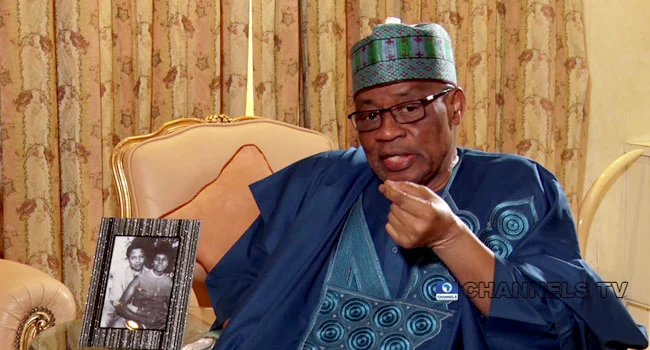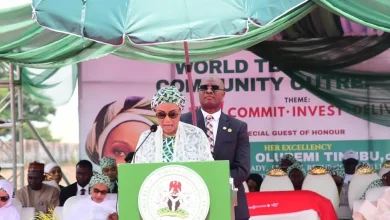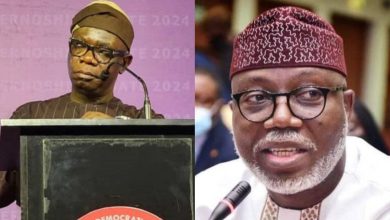Babangida’s June 12 Confession: Will Nigerians Ever Forgive His Regime?

Despotic retired General Ibrahim Badamosi Babangida released his book, “A Journey In Service-An Autobiography,” on Thursday, February 21, 2025. Clearly, the book is an attempt to please the all-powerful God, not any individual.
The worry of avoiding Aljannah if essential atonement is deserted here on earth cannot be ignored as he enjoys the twilight of his life and believes that he is in an age bracket when going the mortal road is imminent.
For the first time, the wicked military tyrant in Nigeria’s political history publicly voiced a lackluster apology during his book presentation, which was attended by all known famous live victims of his misrule in Abuja: “I regret June 12.” I assume full responsibility for the choices made and the events of June 12. Mistakes and blunders occurred quickly after one another. That historical mishap is quite unfortunate. The country has a right to anticipate my apologies.
Those well chosen phrases, in Babangida’s customary dishonest language, evoke sentiments of nostalgia for a preventable military power grab that plunged the nation into an unsolvable political and economic quagmire.
Time teaches Babangida, other power-hungry people, and living things the worth of life, but people don’t change until they are confronted with the harsh realities of life. Babangida’s 83rd birthday party marks the arrival of his terrible reality. And he recently acknowledged the truth regarding his fraudulent annulment of the June 12, 1993 presidential election, which Bashorun Moshood Kashimawo Olawale Abiola won handily. For decades, he has avoided this fact in an effort to maintain his pride and his already severely damaged leadership reputation.
The seriousness of Babangida’s book launch can be dismissed in a nation where the younger generation lacks a true understanding of their history. They can easily reject it as a ritual, often carried out by political leaders posing as writers to dress up history in the color of their choice.
The possibility that Niccolo Machiavelli had Babangida and possibly other Nigerian political gladiators in mind when he made the observation several decades ago that “Everyone sees what you appear to be, few experience what you really are” is not ruled out by the aforementioned. Nigerians who were old enough to remember Babangida’s time as an imperial military ruler are aware that he was a power-hungry political monster who nearly brought this nation to its knees on both a political and economic level.
He promoted an amazing policy concept that he never experimentally implemented thanks to the group of bright brains he surrounded himself with during his imperial reign in power. Actually, Babangida embodies the well-known adage that leaders should lead by example rather than by precept.
IBB’s failure to trust his instincts, which are selfless messages from his soul, at the height of his political power serves as further evidence of the harsh truth that confronts him today. He joyfully gave in to sensual pleasures. He has reluctantly come out with his autobiography to half-heartedly confess the sad truth of how he denied Nigerians the chance to have a president in Abiola who still holds the record of winning an untainted election in the history of this country’s presidential elections, despite his conscience giving him sleepless nights over his misrule over Nigeria and especially his wrongdoings toward Abiola.
Instead of directly apologizing and pleading with his own countrymen for forgiveness, IBB was occupied with blaming General Sani Abacha and Aikhomu through his secretary, who he said issued the annulment press announcement while he was in Katsina state without his approval. This is even though he was aware that neither was able to protect themselves.
Unfortunately, Babangida made sure that most of the people he used to plan the evil June 12, 1993 presidential annulment story—including Arthur Nzeribe, Abimbola Davis, Clement Akpamgbo, Justices Dahiru Saleh and Bassey Ikpeme, Professors Humphrey Nwosu and Omo Omoruyi, and—most importantly—General Sani Abacha and Vice Admiral Augustus Aikhomu—were dead. Their deaths were clearly a calculated strategic move. That is what young Nigerians should know about Babangida in the past.
Nigerians should avoid IBB’s deceptive buck-passing presentations by portraying himself as a victim of a problem he willfully created, causing Nigerians to experience unfathomable anguish and despair in the process. This is the main lesson to be learned from the chapter in his book that focuses on his journey to nowhere political transition policy.
Millions of Nigerians liked IBB, but many did not trust him because of his false smiles and gap-toothed smiles while he was in power.
Benjamin Franklin once said, “Life’s tragedy is that we get old too soon and wise too late.” Babangida’s recent admission supports this statement. The unfortunate aspect about IBB’s life and reign as this nation’s military ruler is that he is growing wiser. After his deliberate, vile political scheming, that is.
“What you’ve done is all that matters in the end, when it’s all over,” remarked Alexander the Great. For Nigerians with a detached view of history, it is important that IBB has dependable leadership and true statesmanship. We are more concerned with how he irrevocably damaged our political and economic landscapes with his dishonest foreign-induced Structural Adjustment Program (SAP), which resulted in the devaluation of the Naira and a pitiful frenzy for applying for and receiving looted loans from the International Monetary Fund (IMF), than we are with his belated admission.
Records show that Nigerians attempted to halt IBB’s economic and political transformation.
Yours genuinely was protesting his hostile policies and political abracadabra in the streets at the time alongside other patriots. Yours truly wrote editorials and damning articles in newspapers alongside other patriotic writers, journalists, and campaigners, but the “evil genius” and his tyrannical gang disregarded us. It is understandable why Thomas Paine once warned that “nobody should trust a body of men who hold themselves accountable to nobody.” We weren’t held accountable by Babangida and his group, who forced themselves on us. It is not credible to believe such a ruler’s story about the annulment of June 12 or their apology.
Even with Babangida’s questionable admission, the anguish of his regrets over the annulment of the June 12 presidential election may not go away because it also resulted in his humiliating removal from office over 33 years ago.
His claim that he was “not only in government but also in power” is something we will never forget. Millions of supporters of the June 12 presidential election protested against his choice at the moment, and he issued a statement to harshly admonish them. With his unquestionable hunger for power at that time in history, Babangida was prepared to destroy this nation, even if it meant ruling over its ashes.
Read Also: Fraud: EFCC Returns $132,548 and N78m to Foreign Victims
The heavenly command that “to err is human but to forgive is divine” may provide comfort to Babangida.
Not even on any fictitious national security report, Thomas Aquinas’s famous quote, “No evil can be excused because it is done with a good intention,” perfectly captures the injustice of the June 12 criminal annulment and the brutal removal of MKO Abiola for the majority of morally upright Nigerians. This is the pointlessness of Babangida’s ambivalent apology at the book launch.
This article was written by Sanusi, a journalist and corporate lawyer from Lagos.





